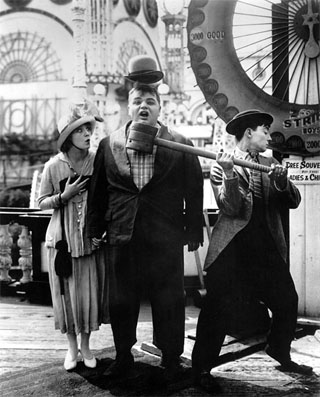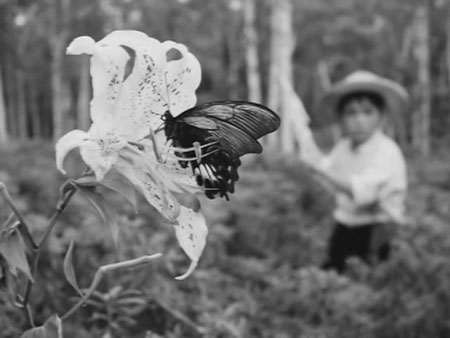I’m going to tread carefully with this one. The first thing that needs to be said is that we at Fandor are as proud to be presenting the digital premiere of Caveh Zahedi‘s The Sheik and I as we are glad that Factory 25 will be presenting the film in theaters in various cities over the next several weeks. Secondly, if you missed the “Caveh Zahedi 100,” the annotated list of his all-time favorite films, here it is, the weekend, a fine time to catch up with it.
Now then. On Tuesday, Caveh stirred up a flurry of controversy by posting this video:
So. Thom Powers has responded. I’ll grant him this: “Blacklisted” is a bit strong. In the meantime, Eric Kohn has reported on the order of events at Indiewire, and now, producer and Filmmaker editor Scott Macaulay has not only presented a well-considered and sober account of the run-in but also followed up by emailing questions to both Caveh and Powers. And, with Thom Powers’s permission, Scott posts three emails Powers sent out earlier this year, one to Caveh, one to SXSW Film Producer Janet Pierson, and one to Scott himself that is evidently similar to two others Powers sent to journalists, one of them being Eric Kohn. The cumulative effect of reading these three emails, one after the other, is rather chilling. This was a campaign. And I’m going to leave it at that.
In other news. “Curzon Cinemas, a London art-house film organization, has solicited Scott Walker to program a mini-season of its On Demand content,” reports Carrie Battan at Pitchfork. “Walker has chosen ten of his favorite films to be made available in the coming months.”
Reading. “The Comique Film Studio was located in a warehouse at 318-320 East 48th Street, in the tough neighborhood west of the elevated subway tracks on First Avenue.” And it was here that Buster Keaton first met Fatty Arbuckle and performed in front of a camera for the first time. “Keaton with his elegant, laid-back air improvised a routine with a broom and was instantly hired.” Charles Simic tells the story for the New York Review of Books.
Fresh from the Chiseler, David Cairns on Walter Connolly: “His very appearance is enough to trigger sympathetic gastric pangs in the viewer. Not all fat men are merry.” And John Strausbaugh on May Irwin, who “brazened and brassed her way to stardom in vaudeville, the Follies, nightclubs, records and movies. Along with The Last of the Red Hot Mamas, she was billed as The World-Renowned Coon Shouter and, least appositely, The Queen of Jazz. A bit like Mae West in her day or Madonna later, what she lacked in looks and performing skills she made up for with the power of her persona, bowling audiences over with humor, schmaltz and innuendo, whatever it took.” And Jim Knipfel asks of a late 19th-century vaudeville act, “were the Cherry Sisters in on the joke, or did they honestly believe in their own righteous talents?”
Matteo Garrone’s Reality “is the ultimate movie about contemporary power,” Franco Berardi Bifo in e-flux journal #40. He also has notes on Jeff Nichols’s Take Shelter: “Only those who are hopeless know the unspeakable way to happiness.”
“Like so many of Jem Cohen’s efforts to marry images and sounds since his early collaborations with friends like R.E.M. and Fugazi in the 1980s, We Have an Anchor is as beguiling as it is unclassifiable,” writes Jason Anderson for Artforum.
The Los Angeles Times‘ Susan King finds Francis Ford Coppola “in a reflective mood” and asks him what might have happened if One From the Heart (1982) hadn’t sunk Zoetrope Studios: “I was working on another idea… thinking about the wonderful era of the golden age of television, when those great live dramas were made. I thought there could be a live cinema in modern time where pieces like One From the Heart were performed live. That was why it was all [shot] in a studio.” Related viewing: Cinephilia & Beyond posts A Legacy of Filmmakers: The Early Years of American Zoetrope.
The New Republic runs Andrew Corsello‘s fine and funny appreciation of Christopher Walken.
The ninth issue of One+One Filmmakers Journal is up.
Lists. Above: David Ehrlich‘s video countdown of his “Best Films of 2012”; he’s added a few notes of introduction at Movies.com.
Richard Lawson presents the Atlantic Wire‘s “Best (and Worst) Movies of 2012.”
At Film.com, Scott Harris lists his top ten animated films of 2012. #1: Brave.
Awards. Malik Bendjelloul‘s Searching for Sugar Man has won Best Feature and Best Music at last night’s IDA Documentary Awards. Here‘s the full list of winners and nominees.
The 13 members of the Boston Online Film Critics Association have named Zero Dark Thirty Best Picture, Kathryn Bigelow Best Director, and Jessica Chastain Best Actress.
DVD/Blu-ray. “A new collection from TCM and Universal, Dark Crimes, brings together three crime thrillers from the 1940s that, surprisingly, have never been released on DVD before,” writes Dave Kehr in the New York Times. “The offerings include two films from Universal’s Paramount holdings, The Glass Key (1942) and The Blue Dahlia (1946), both starring one of the hottest (if tiniest) box office teams of the decade, Alan Ladd and Veronica Lake. The third is Universal’s own 1944 Phantom Lady, the first American film noir directed by the European émigré Robert Siodmak, which, with its audaciously stylized cinematography by Elwood Bredell (credited here as Woody Bredell), was one of the pivotal films that established the look of noir for the decade to come.”
New York. MoMA’s series Art Theater Guild and Japanese Underground Cinema, 1960–1986, running in conjunction with its major exhibition, Tokyo 1955–1970: A New Avant-Garde, opened on Thursday and runs through February 10. At the L, Aaron Cutler recommends Kazuo Kuroki’s Silence Has No Wings (1966), screening tonight and again on December 14.
Elaine May’s Ishtar (1987) screens tonight at the IFC Center. As Richard Brody writes at the New Yorker, the film “has become synonymous with ‘absurdly expensive folly’ when it should simply be seen as one of the strangest, deepest, funniest, most exuberant, and yet most painful comic explorations of the artistic life (and, for that matter, of American political chicanery worldwide) that exists.”
In the works. “Alejandro González Iñárritu is set to direct Birdman from a script he co-wrote with Nicolas Giacobone, Alexander Dinelaris and Armando Bo,” reports Liza Foreman for TheWrap. “Known for more dramatic pieces like Amores Perros, Babel and Biutiful, Iñárritu will be tacking a comedic film for the first time.” Also: “Nicolas Winding Refn is in early talks to direct the Denzel Washington thriller, The Equalizer.”
Listening (21’04”). Robert Koehler and Nicolás Pereda “discuss the relationship between critic and filmmaker, constraint-based filmmaking, and the politics of the film festival.”
Viewing (65’10”). David Bordwell‘s Keynote Address at this year’s Toronto International Film Festival, “Back to the Drawing Board: Digital Cinema and Film History.”
Viewing @ DC’s. “Le Petit Mac-Mahon de David Ehrenstein presents … A Triple Feature”: Tom Schiller’s Nothing Lasts Forever (1984), Gregory Markopoulos’s Twice a Man (1963), and Jacques Rivette‘s Duelle (une quarantaine) (1976).
And one more (3’25”). “This is a great example of a Hollywood publicity stunt gone right,” begins Alex Billington at FirstShowing. “Fox France held a premiere screening, with the help of the City of Paris, of Ang Lee’s wonderful Life of Pi—a must see if you haven’t yet—inside the Piscine Pailleron swimming pool, a listed building in Paris. If you’ve read the book or seen the movie, that’s how Pi gets his name. The audience sat in ‘Tsimtsum’ lifeboats, complete with life jackets, to watch the 3D movie. Amazing.”
More browsing? Check in with the Film Doctor.
For news and tips throughout the day every day, follow @KeyframeDaily on Twitter and/or the RSS feed. Get Keyframe Daily in your inbox by signing in at fandor.com/daily.





